Today we will be interested in the conditions of adoption. The thing is that in Russia more and more often people are faced with infertility. One in which even IVF does not help to become a parent. In such cases, some citizens decide to adopt the baby. But how to cope with the task? Who can be an adoptive parent? In what cases can the process fail? What will be required to implement the idea? The answers to all this and not only will be necessarily discovered below. With proper preparation, it will not be too difficult to take a child into a family to raise a child.

Categories of adoptive parents
First, find out exactly who can act as an adoptive parent. After all, not all citizens have such a right.
At the moment, in Russia, a couple can take a child from a baby's home or from an orphanage. This rule applies to both husband and wife, as well as to common law marriage. In the second case, you have to try pretty hard to achieve adoption.
In addition, among potential parents for babies, individuals are distinguished. That is, a woman or a man who meets the established criteria. But in real life, it is very difficult to take a baby to a family alone.
Who can become an adoptive parent? Pensioners and older people also have the right to do so. Only they should be self-sufficient and able-bodied. Disabled or legally incompetent no one will trust the child.
In fact, almost any adult and adequate person in Russia can try to make a step-mother happy. The main thing is to properly prepare for the process.
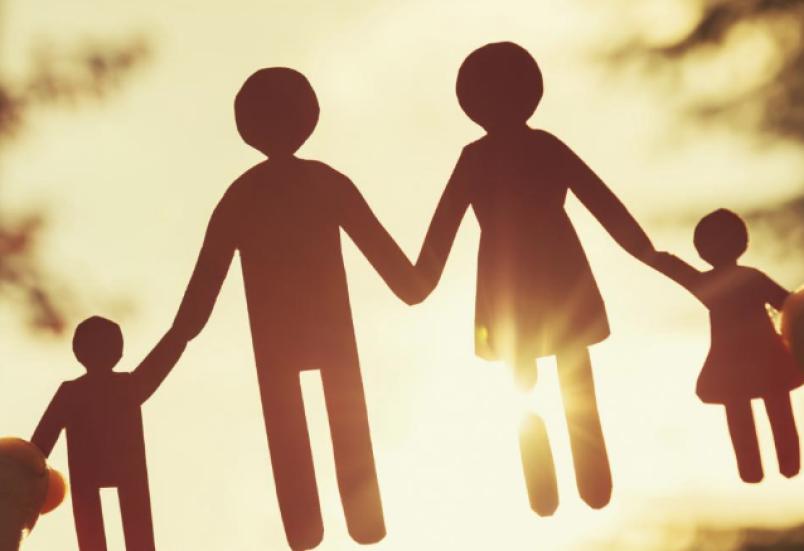
Limitations
Adoption conditions in the territory of the Russian Federation are quite strict. And therefore, not every family will be able to raise a non-native baby.
Who does not have the right to be an adoptive parent? At the moment, there are such restrictions:
- disabled citizens;
- incompetent or partially incapable;
- persons with a criminal record;
- deprived or limited in parental rights;
- inadequate or mentally ill.
An ordinary average person or a married couple will be able to take a baby to the family. The main thing is that the age difference between the ward and foster parents should be more than 16 years. Otherwise, guardianship authorities will not allow further paperwork.
If a person does not have permanent housing or is unable to provide for a child, adoption can be forgotten. The apartment does not meet the established standards of comfort? Then guardianship will also not allow taking a non-native baby into the family. These are quite common phenomena that you will have to prepare for.
Basic conditions
The age of adoptive parents is approximately clear. Ideally, these are people after 18 years of age who have a difference of more than 16 years with the adopted person. But there are exceptions. For example, emancipation. Then you can take your baby up to 16 years old. Only in real life, such cases are almost never found.
Here are the main conditions for adoption:
- legal capacity and working capacity of citizens;
- the presence of a steady income;
- material solvency;
- the possibility of providing the child with a separate room (highly desirable);
- the absence of any serious diseases;
- maintaining a normal lifestyle.
Foster parents just have to be wealthy and decent people. Nobody trusts the impoverished kids. Low salaries can interfere with future actions of potential parents.This should be remembered before starting the procedure.
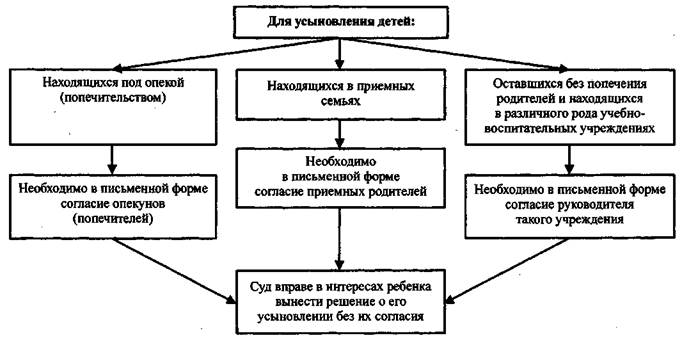
Briefly about the process
A few words about how the process under study is carried out. If the conditions of adoption are met, you can proceed with active actions.
Instructions for taking the baby from the orphanage looks like this:
- Collect the documents necessary for the adoptive parent. We will review their list below.
- Find a child whom you want to take in a family. It is better to start from this stage. The federal adoption database of children can help people.
- Contact the orphanage or baby house and fill out the adoptive parent's application form. This step helps you find a child for a particular family.
- To get acquainted with applicants for adoption. Be sure to view all documents of the minor.
- Personally meet a future family member. It is important to find contact with the ward. Only then the adoption will take place without much trouble. Especially if the child immediately began to consider adoptive parents as parents.
- Submit a request to the orphanage for adoption.
- Wait for an answer. Typically, the procedure is carried out through a court hearing with the involvement of guardianship authorities.
- Draw up documents for the child in your own name.
That's all. It would seem that there are no special problems. The maximum is to choose a baby for homestay. But in reality, everything is much more difficult. Especially if at least one of the mandatory conditions for adoption is not respected. Most often, troubles deliver housing and earnings.
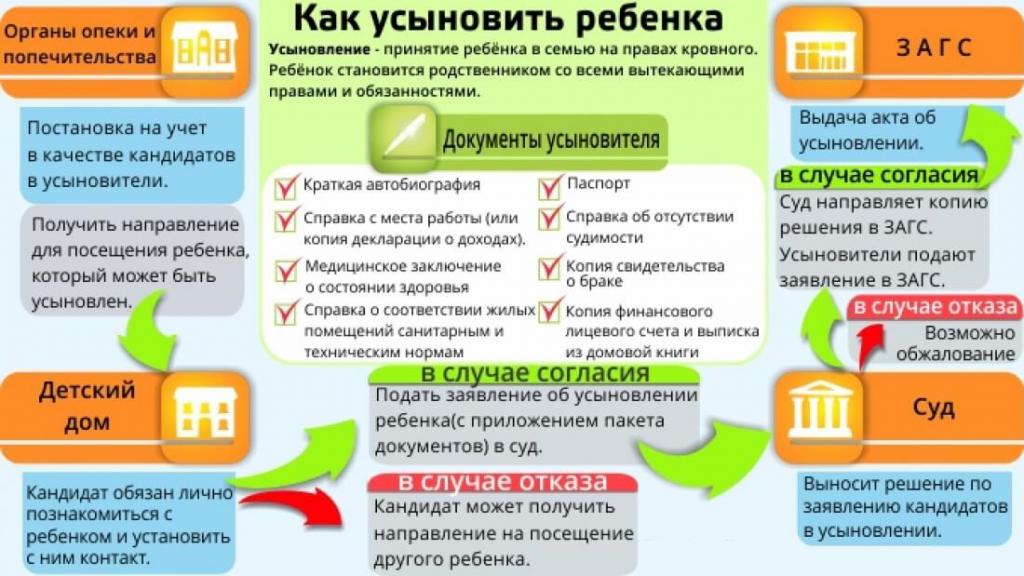
We are in custody
The beginning of paperwork (and it is very serious in the matter under study) was laid by contacting guardianship authorities. This is the first test that a modern family will face.
Here, citizens should be issued a certificate confirming that there are no barriers to adoption. Accordingly, already at this stage the family will have to face paperwork.
The appeal to the PLO takes place at the place of registration of the applicants. Within 14 days, the request will be considered. Sometimes the procedure takes a month. In the end, the family will either be allowed to be adoptive parents and will be given a certificate, or they will be forbidden to take their children upbringing.
Guardianship documentation
In Russia, the adoption of children brings a lot of trouble. The conditions and procedure for the adoption of a non-native baby in the family are quite stringent. And even the average family may be denied.
The main thing is to correctly form a package of documents. The following components are useful to foster parents:
- passports
- an application for a certificate of the established form from the PLO;
- Help with registration;
- marriage / divorce certificates;
- income statements;
- certificates of ownership;
- any papers indicating the availability of separate housing (including rental);
- health certificate;
- Certificate of Foster Parenting
- characteristics from the place of study / work;
- autobiography;
- spouse's consent to the procedure (preferably);
- statement of no criminal record;
- a document on the absence of registration in certain dispensaries;
- confirmation of public housing compliance services with established comfort standards;
- statement of personal account at home.
Other evidence of family solvency and normal parental behavior is also advisable. For example, indicate independent witnesses who can confirm the relevant facts.
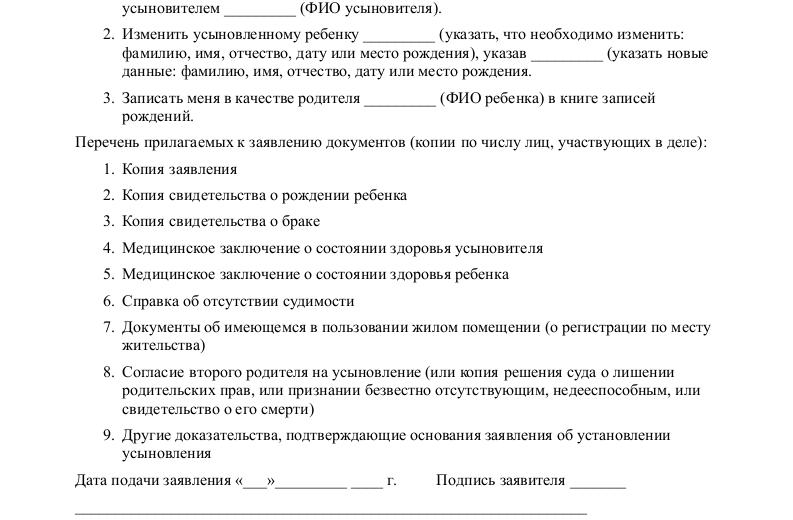
Documentation for the orphanage
Suppose that the conditions of adoption are met and citizens are issued a certificate of the established form in the guardianship authorities. What's next?
Now you have to go to the orphanage and find a child. It is best to do this in advance. After all, getting to know the baby and making contact with him is a long and painstaking business.
In the orphanage, where foster parents go, you need to bring all the papers listed above. They report to them:
- OOP permission;
- application form for applicants;
- questionnaire with the characteristics of children (for the selection of candidates from the total mass).
It's all. Now it remains only to wait, and then get acquainted with the documentation of the children and with the kids themselves.
Inquiries for children
Mandatory conditions for adoption in the Russian Federation are not always easy to observe. But to do it is possible.
If a couple or person decided to bring up the baby, you will have to familiarize yourself with his documents:
- birth certificate;
- Parent data
- certificates of planting;
- psychologist examination results;
- documentation of the deprivation of parental rights;
- medical certificates.
Maybe the child was born in a family where parents suffer from drug addiction or alcoholism. Such facts should not be hidden from adoptive parents. After all, heredity can play a role at the most inopportune moment. And potential parents should know exactly which child they have to deal with.

To court
The penultimate stage is to go to court for adoption. The paperwork here is also very serious, but there will be no problems with it. In addition to all the components listed above, you will have to attach the consent of the orphanage to adoption.
During the trial, there is a study of the proposed package of papers. On the basis of relevant materials, a decision is made.
Mandatory interview children over 10 years of age regarding adoption. If a child categorically refuses to live with specific parents, no one will force him to do so.
Children under 10 years old are not questioned in court. Instead, they can invite a psychologist who will tell you how well the parent-child contact is made.
After the trial
So, a court order with a positive decision on hand. What's next?
Now it’s worth the wait until the decision comes into force. After this, parents are issued certificates of adoption. But that is not all.
The final stage is the renewal of the child’s documents in his name. Up to this point, the child can already be taken home. In reality, everything is not as scary as it seems. But you have to try.
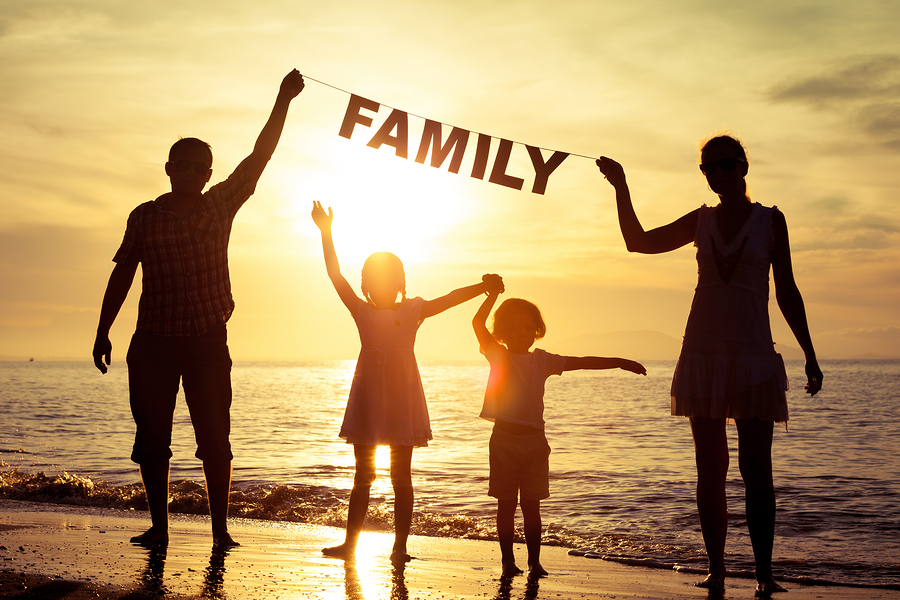
About rights
The rights of adoptive parents are also of interest to the population. After all, the family will not be native. Does it somehow affect the life of the child?
Only psychologically, if the baby remembers his parents. The rest of the adoptive parents become legal representatives of the minor. They have rights and obligations regulated by the Family Code.
The only caveat: if the child wants, he can communicate with his biological parents. But only on condition that such contacts are not dangerous in physical or psychological terms. As a rule, such initiatives are almost never encountered.
Moreover, adoptive parents can receive state payments due when a child appears in the family. For example, a newborn care allowance or maternity capital. Registration of appropriate compensation is carried out in the same way as in an ordinary family.
Conclusion
The health certificate of the adoptive parents is taken at a medical institution. For example, after undergoing medical examination. It is worth looking into a neuropsychiatric dispensary and taking a certificate of non-registration there.
We found out what are the conditions for adoption in Russia, and got acquainted with a similar procedure. This is actually a rather troublesome task. Sometimes even an average family cannot take on a step-child. Such cases are more and more common. If a couple or an individual is refused, you can eliminate the reasons for the denial, and then try to get a positive decision again.
